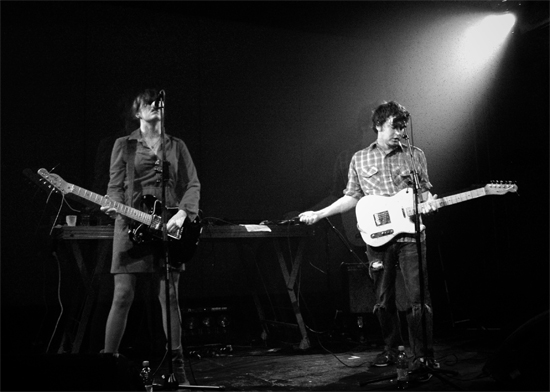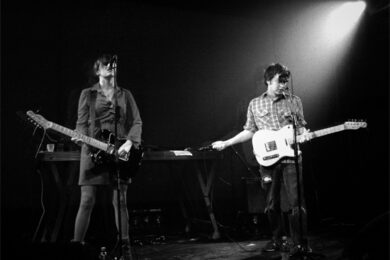Ben Chasny, the polymath behind Six Organs Of Admittance, knows something that probably anyone reading this is aware of: we live in a era of technological immediacy, where music is analyzed and enthused over 24/7; ripped, shared, uploaded, traded, torrented, leeched. And, of course, the work of his own group is no less prone to such surgical procedures, no matter what the status of its original release.
It’s the desire to explore the understandable tension between music production and consumption that prompted the course of this interview, one that Chasny frames with this follow-up note: "The answers I gave are coming from a completely dystopian and cynical view of things. Obviously I participate in this sort of culture, including message boards, websites and blogs etc. I’m not trying to put myself above all of that, just trying to look at it all and my place in it all as well . . . These are sort of complicated issues, and even then I am generalizing quite a bit . . . but these are the issues that I think everyone needs to look at if they are at all interested music today."
Which may sound heavy going – but keep his concluding words to me in mind as you read: “Stay positive!”
The start of Six Organs coincided with the beginnings of wider online file sharing and a greater emphasis in limited edition runs of releases, whether in terms of vinyl or CDR runs or the like. Did you have any feelings, positive or negative, about these developments at the time, and have your feelings changed much between then and now?
BC: "I feel that what was once considered fetishism in collecting music may become much more important in terms of creativity and long-term consciousness (and I don’t use that term as some hippie speak). Let me explain: what I have noticed over the years is that people are being more and more herded, by themselves, into believing that faster is better when it comes to obtaining music. Faster has always meant "better" to the modern mind, so it makes sense that if one can obtain music faster with new technology, one must be progressing, right? But we humans happen to be living at a peculiar time as we find ourselves at the point on the technological line that is about to go vertical in its exponential slope on the chart of progress. Essentially, we are standing on the verge of what some scientists call the technological singularity, which is the point where technology will begin to overtake humans in intelligence as they recreate themselves and reproduce.
"Yes, this is some William Gibson business, but landing on the moon was once a fairy tale as well (this year Stanford University created a helicopter that could teach itself to fly by watching other helicopters. If that isn’t sci-fi, I don’t know what is). Some see this as a positive future and a part of our evolution as we fuse our bodies with this technology. Some see this as the end of Humankind (Paul Virilio has stated that there will be aliens on this earth but the aliens will have evolved from us. And we won’t even get into what Virilio says about the inevitable ‘accident’ as we fuse ourselves with technology). So back to what I was saying before – I see people thinking that faster-is-better as conditioning themselves (I don’t believe this is some conspiracy) for the inevitable technological singularity.
"And it’s not just the idea that faster-is-better that informs this conditioning. Another is separation from other humans. People have begun to separate themselves from other people and substitute it with a representation of an analogue (people meeting face to face) community; ie blogs, message boards, websites, etc. This representation is mediated by forces out of their control. And I see all of these things as a great conditioning for the inevitable point where man faces this singularity.
"So I see these limited releases (or even non-limited but made with intent) that used to be considered merely fetishistic objects as actually tiny pieces of analogue (as in real life, I can touch it) strands that may keep us human just a bit longer. They are not immediate in their existence. There might be a blog that has ripped the information from the cassette tape, LP or CD and even taken a picture of the object to further represent it, but it is nice to know it exists as a real object out there. I don’t think it will stop the inevitable end, but they are nice barbs in the road. And being aware of it is important, or at least interesting.
"For instance, the other day I came across the first Sun City Girls LP on a blog. It’s absolutely out of print, no way I will probably ever see it in a store or on eBay for a sum I could afford, so that left me with a clear conscience about downloading it for free. But I realized, how much pleasure would I get from it anyway? Why do that? Just to say I have it, that I have heard it? I decided not to download it because it would be much more enjoyable to at least share the experience with someone else. Maybe someone will play it for me one day. Until then, it’s just information.
"And I do believe we are becoming addicted to information. You only need to look at those people who have hard drives filled with songs that they have never even listened to. They are not even collecting music. They are collecting information. And the more people become addicted to information and the faster they can obtain that information, the less they will be able to contemplate that information, and it is the contemplation of the information which makes it art."
An argument I’ve heard advanced is that there’s been a general devaluing of music in recent years – not merely in economic terms and expectations, but as a more central role or defining marker of what makes a person and who they are. What would be your take on this assertion?
BC: "I do believe that music is generally being devalued because of this addiction to information that I was speaking of. I like to compare it to a drive through the countryside. If you are driving at a comfortable pace then you are able to enjoy the sights of the countryside for yourself; the trees and the color of the sky and the sad-eyed cows, etc. If you are driving 100 miles per hour, there is no way you will be able to enjoy what the countryside has to offer. You will be too busy reacting to contemplate; the potholes, the corners, the lone farmer’s truck.
"In this way, as everything has been made available and there is so much to take in and the speed at which we are able to acquire music increases, there is no way to contemplate and really think about things unless one makes a conscious effort NOT to take everything in. It’s a matter of contemplation vs. reaction. People need to learn that they don’t need to obtain everything that is available to them (this would be good advice for politicians as well). I see this also as a reason why music criticism has generally declined in value and importance as well. There is too much for critics to think about. They have no time to contemplate, they can only react.
"Music began to play a more widespread role in a community aspect as records began being produced and disseminated. When the radio broadcast the same sounds to the same houses and one knew that they were listening to a song that perhaps someone in some other house was listening to at the same time, that was a shared experience. Or they had a record and they could play it for a friend.
"As music began to be disseminated in a much less focused manner it began to lose its means as a way to strengthen communities, at least on a reproduced scale that was outside of a performance. I would argue that a bunch of avatars arguing over whether or not a band’s record is as good as the last on a message board is a less strong community than a group of friends listening to a record together (even if the friends got into an argument over the same thing. And especially if they got into a drunken argument and started beating each other up!)
"So I would say it’s not the music that has become less important but the new communities that have been created. However, if a certain music has tied itself to that sort of community instead of trying to exist autonomously, then yes, I think that music is of lesser value as well. Just to me though, I can’t speak for others when it comes to values. But then again, I find the game of canasta of much less value than my grandmother, so it’s all generational I guess!"
What would be the advice you’d most liked to have given yourself when you began releasing work as Six Organs? And what advice would you most want to give to a starting musician now?
BC: "The same for both: study mathematics instead!"
The compilation of rarities and collaborations RTZ is out now.



